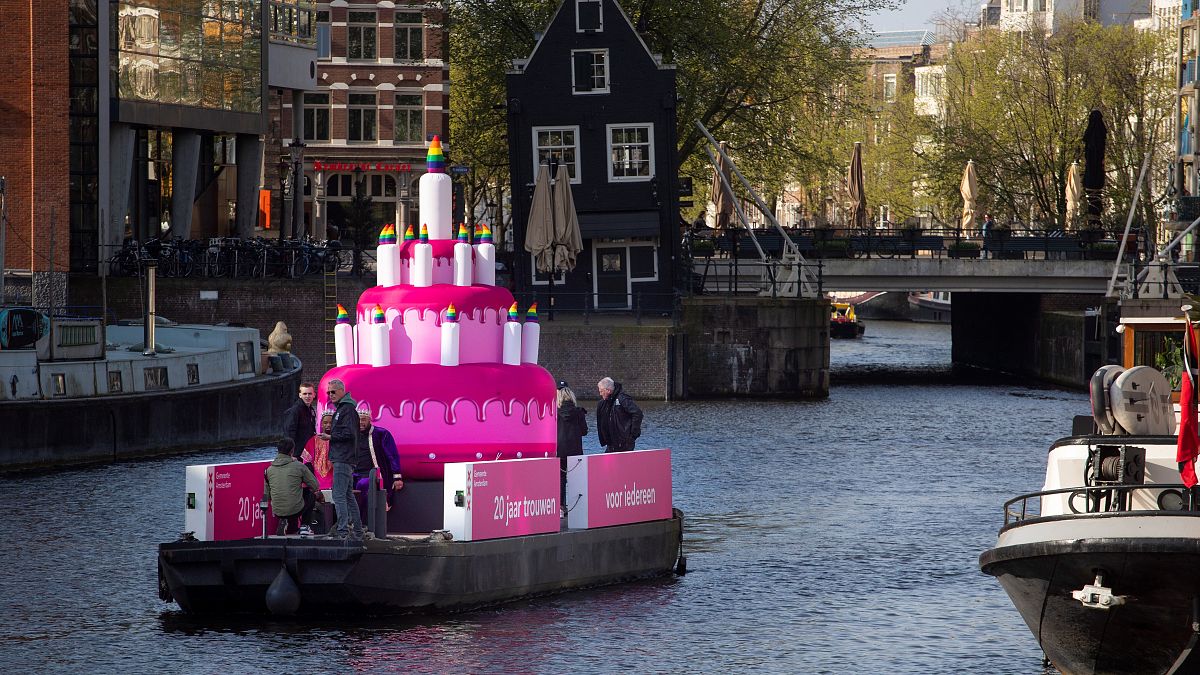Progress over the last two decades has been welcomed by campaigners for LGBT rights, but they warn remobilisation is needed to maintain progress amid backlash in some parts of Europe.
Amsterdam has marked 20 years since the world’s first gay marriages by floating an inflatable pink cake with candles spouting rainbow flames down the canal.
Twenty years ago on April 1, the city was host to a historic event when the mayor married four couples in the city hall and the Netherlands became the first country in the world to legally recognise same-sex marriage.
The celebrations on Thursday mark a milestone after two decades when LGBT rights have flourished in many parts of Europe and further afield, with 16 countries in western Europe having now legalised same-sex marriage.
But activists warn that the work is not done.
According to Evelyne Paradis, Executive Director of ILGA, the emergence of authoritarian and populist politics and leaders in some European countries in the last few years has come hand-in-hand with pushback against LGBT rights.
“Across Europe, the fact the situation has deteriorated so much is actually forcing everyone to recognise the work is not done,” she tells Euronews. “There’s a remobilisation of supporters who may have become a little too complacent.”
She says the type of populist politics which has emerged in countries such as Hungary and Poland is one “thrives on scapegoating parts of the population, and LGBTI communities have been one of the scapegoats,” targeted by political actions, and also rhetoric.
Backlash against LGBT equality in Europe
The rights that LGBT people are now entitled to in much of the world are still missing in some European countries, such as Russia, Poland, and Hungary. There, campaigners continue the fight for more equal treatment in the eyes of the law - and society.
Hungary and Poland, in particular, are at odds with the European Union over the issue. Hungary recently passed a law that de-facto prohibits adoption for same-sex couples.
And in Poland, the EU withheld grants to a number of Polish cities that had adopted so-called ‘LGBTI-free zones’, or signed discriminatory ‘family rights’ decrees.
"EU values and fundamental rights must be respected by member states and public authorities," Helena Dalli, the EU's Equality Commissioner, said at the time.
“On the one hand there’s been lots of progress with other countries in Europe, but in recent years we have seen a backlash in some countries like Poland, where even today the leader of the ruling party says that as long as they are ruling, there will be no place for LGBT or gender ideology,” says one activist in Poland on the frontline of the battle for LGBT rights.
Kamil Maczuga was nominated for the European Parliament’s Sakharov human rights prize in 2020, for his work mapping out municipalities in Poland which were signing decrees declaring themselves “LGBT-free zones”.
His work on the online ‘Atlas of Hate’ tool has, along with the support from the European Parliament, slowed the spread of these decrees.
“A strong push from the European Parliament helped to stop the spread of these so-called LGBT-free zones, I think there have been no new declarations since last year,” he tells Euronews.
“Even the ruling party is warning local governments that accepting such declarations might cost them money from the EU. So they are now aware their actions might have some consequences.”
But he adds that the government in Poland - which targeted the LGBT community with rhetoric during last year’s presidential election - is still working to discriminate against LGBT people.
“What we need right now is strong support, we should work together, it doesn’t matter in which step the country is. Even when there is equal marriage in some countries there is still discrimination and so we need to create alliances and work together.
Reasons to be hopeful
One country in Europe that has been held up as an example of turning around attitudes and laws affecting the LGBT community is Ireland.
Same-sex sexual activity was only decriminalised in 1993 in what was at the time a deeply Catholic country.
In 2015, following a referendum on the issue, same-sex marriage was enshrined in law.
And the country's last Taoiseach, Leo Varadkar, was only the fourth openly gay head of government or head of state in the world.
Paula Fagan, the CEO of LGBT Ireland, says the anniversary of the first same-sex marriages is a cause for "cautious celebration", but adds "the road to equality remains a struggle".
"Anti-LGBTI+ sentiment is increasing across many countries and we must work hard together to advance and defend LGBTI+ rights," she tells Euronews.
And she points out that "despite what many would view as huge progress in LGBTI+ issues", there is still "much work left to be done in law and policy reform here in Ireland to ensure LGBTI+ people can feel safe, protected and welcome".
Looking at Europe as a whole, she says "it is encouraging to see such developments such as the LGBTIQ European Freedom Zone and the EU LGBTIQ Strategy", which has come at a "critical moment in time for Europe".
Evelyne Paradis says “it might get worse before it gets better”, but she points to a remobilisation of campaigning in the face of the backlash.
“There are many reasons to be hopeful that we will continue to see progress happening,” she says, including the EU taking a firmer stand on the issue.
“I want to think in five to ten years we’re going to be in a position where things have improved.”
Same-sex marriage has been made legal in 28 countries worldwide, as well as the self-governing island of Taiwan.
